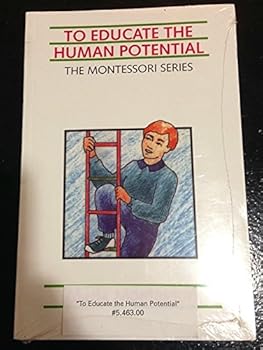TO EDUCATE THE HUMAN POTENTIAL
Select Format
Select Condition 
Book Overview
Like New This description may be from another edition of this product.
Format:Unknown Binding
ISBN:908117245X
ISBN13:9789081172455
Release Date:January 2007
Publisher:Montessori-Pierson
Weight:0.35 lbs.
Customer Reviews
1 rating
Foundations of elementary-age Montessori method
Published by Thriftbooks.com User , 18 years ago
The introduction explains that this book is meant to follow _Education for a New World_, and it "helps teachers envisage the child's needs after age six." This book is part theory, part history, covering the psychology of the elementary-aged child, the history of life on Earth, and some highlights and principles of the development of civilization. This seems to be motivation and background material for the "great lessons" of the Cosmic Education as commonly used in elementary Montessori curricula. Those seeking an introduction to core Montessori theory, especially relevant to three- to six-year-olds, would be better off turning to _Education for a New World_, or the more demanding _The Absorbent Mind_. The first few chapters discuss the educational needs of six- to twelve-year-olds. According to Montessori, it is at the age of six that the child's principle educational need switches from absorption of environment to absorption of culture. A great emphasis is placed upon placing seeds of motivation and "wonder" in the child's mind, using a big, integrating picture of the world which is supposed to raise more questions than it answers, so that the child will desire to fill out his or her knowledge in later years. The child of this age thirsts for moral knowledge, but also for mental independence, claims Montessori, so moralizing lectures will not be accepted and should not be attempted. She also observes that children of this age have a strong impetus to organize themselves socially. An elementary program, it is advised, should not over-emphasize hands-on learning nor abstract subjects which require "imagination," but should integrate both, since the personality is one and indivisible. A chapter is devoted to three psychological principles of the subconscious which are fundamental to the theory: (1) subconscious memory, the "mneme," which is specific to and built into each species; (2) Bergson's "Elan Vitale," or Horme, a vital urge which drives every living creature in every activity of its life; and (3) the Association of Ideas, the principle by which most methods of education conceive that certain ideas must follow and build upon certain others, but is now, Montessori claims, understood by psychologists to be only superficially true on the conscious level, though it does importantly apply to the operation of engrams in the subconscious. The chapter ends with a fascinating argument that a real love for humanity, for one's "neighbor," cannot be based on preachy, patronizing sentiments of political or religious brotherhood, but only upon recognition of the productive toils of those countless individuals, living or dead, who have built and benefited our world. Several chapters tell the story of the world, its nature and history. Surely much of the science here is out of date. The theoretical point met again and again is that the planet and the lifeforms upon it are all interrelated as one whole, working in symphony, progressing upon the Cosmic






